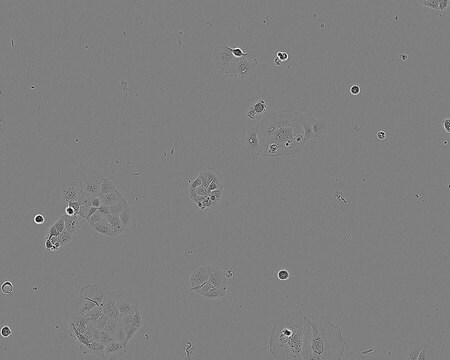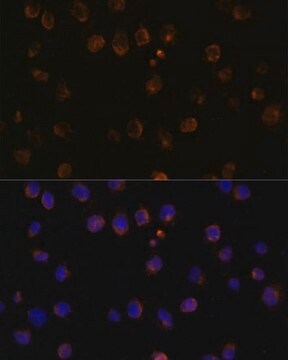About This Item
Código UNSPSC:
41106514
Productos recomendados
origen biológico
human colon
modo de crecimiento
Adherent
cariotipo
Triploid modal no. 71-78
morfología
Clumps of spherical cells in suspension, cuboidal cells in the monolayer
productos
Carcinoembryonic antigen (CEA) less than produced by COLO 205
receptores
Not specified
técnicas
cell culture | mammalian: suitable
enfermedades relevantes
cancer
Condiciones de envío
dry ice
temp. de almacenamiento
−196°C
Categorías relacionadas
Origen línea celular
Human Caucasian colon adenocarcinoma
Descripción línea celular
COLO 201, COLO 205 and COLO 206 (ECACC Catalogue 93052620) were all established from the ascites fluid obtained from a 70-year-old male patient with adenocarcinoma of the colon (Dukes Classification Grade D). At time of isolation, COLO 201 displayed cuboidal morphology but with increasing passage the depositor reported that COLO 201 tends to display predominantly rounded cells in clumps in suspension with cuboidal cells in the monolayer. The Y chromosome could not be detected in this cell line by short tandem repeat (STR)-PCR analysis when tested at ECACC. It is a known phenomenon that due to the increased genetic instability of cancer cell lines the Y chromosome can be rearranged or lost resulting in lack of detection. The cell line is identical to the source provided by the depositor based on the STR-PCR analysis.
Perfil del ADN
STR-PCR Data: Amelogenin: X
CSF1PO: 11,12
D13S317: 10
D16S539: 12,13
D5S818: 10,13
D7S820: 9,10
THO1: 8,9
TPOX: 11
vWA: 15
CSF1PO: 11,12
D13S317: 10
D16S539: 12,13
D5S818: 10,13
D7S820: 9,10
THO1: 8,9
TPOX: 11
vWA: 15
Medio de cultivo
RPMI 1640 + 2mM Glutamine + 10% Foetal Bovine Serum (FBS).
Rutina de subcultivo
Maintain suspension cells at 3-9x105 cells/cm3. Split sub-confluent cultures (70-80%) of attached cells 1:3 to 1:6 i.e. seeding at 2-3x104 cells/cm2 using 0.25% trypsin/EDTA; 5% CO2; 37°C.
Otras notas
Additional freight & handling charges may be applicable for Asia-Pacific shipments. Please check with your local Customer Service representative for more information.
Certificados de análisis (COA)
Busque Certificados de análisis (COA) introduciendo el número de lote del producto. Los números de lote se encuentran en la etiqueta del producto después de las palabras «Lot» o «Batch»
¿Ya tiene este producto?
Encuentre la documentación para los productos que ha comprado recientemente en la Biblioteca de documentos.
Nuestro equipo de científicos tiene experiencia en todas las áreas de investigación: Ciencias de la vida, Ciencia de los materiales, Síntesis química, Cromatografía, Analítica y muchas otras.
Póngase en contacto con el Servicio técnico


